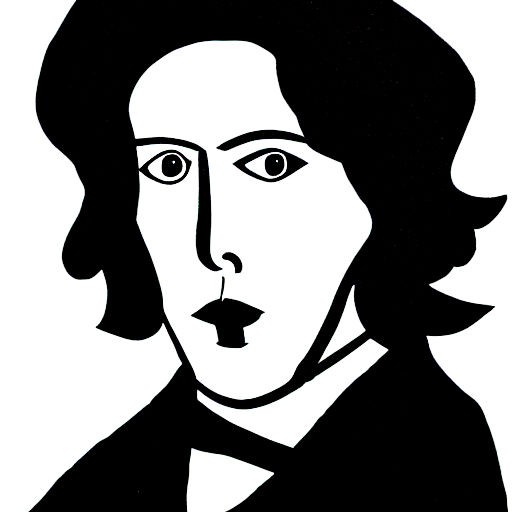Oscar Fingal O'Flahertie Wills Wilde (16 October 1854 – 30 November 1900) was an Irish poet and playwright. After writing in different forms throughout the 1880s, he became one of the most popular playwrights in London in the early 1890s. He is best remembered for his epigrams and plays, his novel The Picture of Dorian Gray, and the circumstances of his criminal conviction for gross indecency for consensual homosexual acts in "one of the first celebrity trials", imprisonment, and early death from meningitis at age 46.
Wilde's parents were Anglo-Irish intellectuals in Dublin. A young Wilde learned to speak fluent French and German. At university, Wilde read Greats; he demonstrated himself to be an exceptional classicist, first at Trinity College Dublin, then at Oxford. He became associated with the emerging philosophy of aestheticism, led by two of his tutors, Walter Pater and John Ruskin. After university, Wilde moved to London into fashionable cultural and social circles.
As a spokesman for aestheticism, he tried his hand at various literary activities: he published a book of poems, lectured in the United States and Canada on the new "English Renaissance in Art" and interior decoration, and then returned to London where he worked prolifically as a journalist. Known for his biting wit, flamboyant dress and glittering conversational skill, Wilde became one of the best-known personalities of his day. At the turn of the 1890s, he refined his ideas about the supremacy of art in a series of dialogues and essays, and incorporated themes of decadence, duplicity, and beauty into what would be his only novel, The Picture of Dorian Gray (1890). The opportunity to construct aesthetic details precisely, and combine them with larger social themes, drew Wilde to write drama. He wrote Salome (1891) in French while in Paris, but it was refused a licence for England due to an absolute prohibition on the portrayal of Biblical subjects on the English stage. Unperturbed, Wilde produced four society comedies in the early 1890s, which made him one of the most successful playwrights of late-Victorian London.
At the height of his fame and success, while The Importance of Being Earnest (1895) was still being performed in London, Wilde prosecuted the Marquess of Queensberry for criminal libel. The Marquess was the father of Wilde's lover, Lord Alfred Douglas. The libel trial unearthed evidence that caused Wilde to drop his charges and led to his own arrest and trial for gross indecency with men. After two more trials he was convicted and sentenced to two years' hard labour, the maximum penalty, and was jailed from 1895 to 1897. During his last year in prison, he wrote De Profundis (published posthumously in 1905), a long letter which discusses his spiritual journey through his trials, forming a dark counterpoint to his earlier philosophy of pleasure. On his release, he left immediately for France, and never returned to Ireland or Britain. There he wrote his last work, The Ballad of Reading Gaol (1898), a long poem commemorating the harsh rhythms of prison life.
Sol turns thousands of years of human wisdom from the world’s spiritual traditions into a totally unique personality profile. To get your own profile, check compatibility with friends and much more, download the Sol App today.
Some of their strengths
Oscar Wilde has many admirable traits.
Based on spiritual traditions from around the world, they are someone who can be described as Confident, Passionate, Intelligent, Bold, Energetic, Optimistic, and Extroverted.
Intelligent and Inquisitive
According to Mysticism’s Astrology tradition, Oscar Wilde is someone who is an intelligent, inquisitive, and imaginative person, who is practical, considerate, kind, and diplomatic in dealings with others. A person who looks for jobs that tend to reflect their identity.
Warm and Caring
Based on Daoism’s Ba-Zi or ‘Chinese Zodiac’ tradition, people who know Oscar Wilde well know them as someone who can be warm, caring, and compassionate, like a lamp or torch.
Independent and Organized
According to Hinduism’s Jyotisha or ‘Vedic Astrology’ tradition, many would also describe Oscar Wilde as someone who is independent, organized, inventive, and generous.
A person who is curious and a loves learning, who seems to always know what to say, who has an optimism that can overcome any difficult situation, and who seems to be able to master almost any skill.
Charismatic and Instinctual
Based on the Mayan Tzolk’in or ‘Mayan Astrology’ tradition, Oscar Wilde is someone who handles stress better than most people, and who tends to have a powerful charisma and convictions.
They are also someone who is confident and creative, and who has a love for starting new projects, inventing new things, and giving back to the community.
Justice-seeking and Peaceful
According to Judaism’s Kabbalah tradition, Oscar Wilde tends to be someone who loves peace and is ready to go to any costs to achieve it. Who has a taste for the good things in life, tends to be a good organizer, has a thirst for knowledge, and who tends to have the respect of friends and acquaintances.
Some of Oscar Wilde's challenges
While Oscar Wilde has many strengths, nobody is perfect. They also have some challenging traits they need to manage.
For example, Oscar Wilde can be Emotional, Hesitant, Narcissistic, Arrogant, Status-seeking, Difficult, and Perfectionist.
Hesitant and Narcissistic
One of Oscar Wilde's key challenges is that they are someone who can be hesitant and narcissistic.
Oscar Wilde must also exercise caution as they can be excessive and unrealistic.
Domineering and Impatient
Oscar Wilde is someone who can be demanding, egotistical, and controlling, can have a lack of judgment regarding personal finances, be argumentative and stubborn, and who can have a tendency to be withdrawn and spend time in self-imposed isolation.
Pleasure-seeking and Indecisive
Finally, Oscar Wilde also can put others first too much, and hem-and-haw too much when making a decision.

